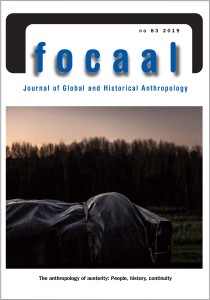Over the past two days, my Facebook feed has been flooded with shares of articles featuring New Zealand patched street gangs and outlaw motorcycle clubs—Mongrel Mob, Black Power, King Cobras—acting in solidarity with the Muslim community and the 50 victims of the recent terrorist attack, be it by performing the traditional haka or promising to “guard” local mosques during Friday’s jumu’ah. Media love the spectacular images of gang members and outlaw bikers, and the news caught like fire across the globe. Many, including some of my leftist comrades, embraced the gangs’ actions with uncritical support—“hearted,” liked, and shared it.
Monthly Archives: March 2019
Heiko Henkel, Sindre Bangstad, and Bjørn Enge Bertelsen: The politics of affect: Anthropological perspectives on the rise of far-right and right-wing populism in the West
This is the first part of a panel held during the 2017 American Anthropological Association Annual Meeting in Washington, DC. The second part is freely available to all readers in the most recent issue of Focaal here.
Over the past decade, the dramatic ascendance of ethno-nationalist and right-wing populist movements and projects has been reshaping the European and North American political landscape. While such movements and projects have played crucial roles in European politics since the emergence of the nation-state—most dramatically so with the rise and fall of fascism in the 1930s and 1940s—they have hitherto remained mostly at the margins of established national and international politics in post–World War II Euro-America. A string of political events, most notably the election of Donald Trump and his turbulent presidency, the Brexit referendum that is about to propel the United Kingdom out of the EU, and the electoral successes (if not always victories) of decidedly nationalist and far-right populist parties across Europe, however, have underlined the viability and dynamism of ethno-nationalism, right-wing populism, and far-right political projects in Europe and the United United. Crucially, it has also become clear that many of these projects and movements both represent and amplify a passionate rejection of what is often described as the failings of the “liberal elite.”
Focaal Volume 2019, Issue 83: The anthropology of austerity
 We are pleased to announce that the latest issue of Focaal – Journal of Global and Historical Anthropology has recently published and is available online at www.berghahnjournals.com/focaal.
We are pleased to announce that the latest issue of Focaal – Journal of Global and Historical Anthropology has recently published and is available online at www.berghahnjournals.com/focaal.